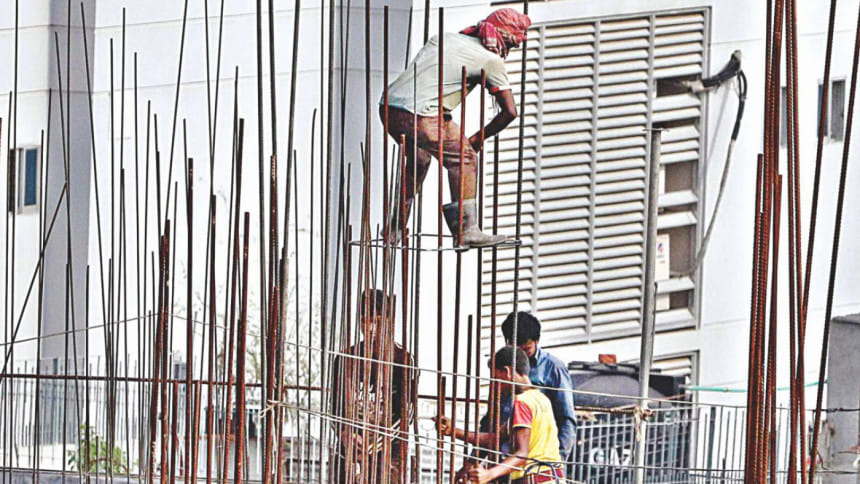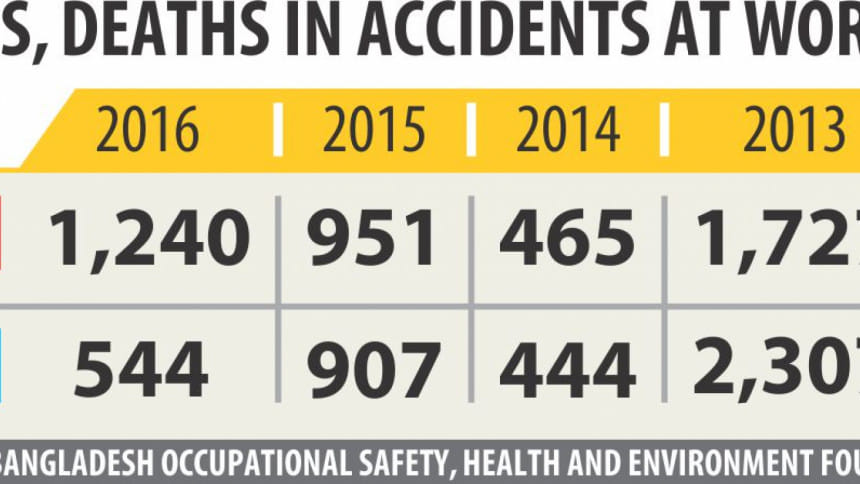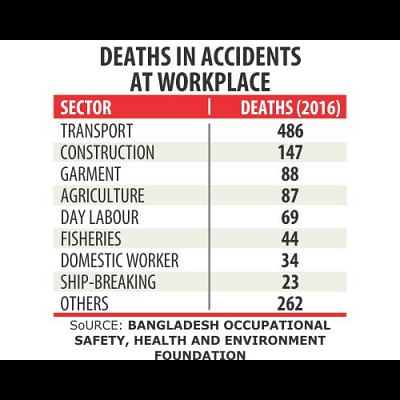Informal Sector: Workers lack legal, social protection

Thirty-year-old Belal Uddin was clueless about the lurking danger.
With an iron rod, he was removing bricks at a construction site in Munshiganj's Gazaria area on January 13.
Accidentally, he hit a power cable with the rod and suffered an electric shock. His face, chest, shoulders, hands and abdomen were severely burnt.
As there was no hospital for treating burns victims in the area, the ill-fated worker was whisked off to Dhaka Medical College Hospital (DMCH). He was treated there for more than three months.
Doctors said it would take a few more months for him to recover fully.
The poor worker is in severe financial crisis, as he has already spent around Tk 3.5 lakh for treatment.
"The contractor provided only Tk 40,000. I had to borrow the rest of the money," Belal from Chapainawabganj's Char Alatulia village told The Daily Star.
He also contacted the building's owner, who had promised him financial assistance. But the help never came.
"I'm helpless now. I don't know what to do," said the landless man, the lone breadwinner of a four-member family.
The story of driver Chandan Pal, 45, of Gazipur's Kaliakoir area is even more appalling.
Chandan was killed in a road accident while driving a bus in Manikganj in June last year.
His 30-year-old wife Bashona Pal has no idea how she would survive.
"I am sick and unable to work. I cannot send my 10-year-old son to school. He may have to work at such an early age...," she said.
Bashona got only Tk 60,000 from the bus owner and Tk 20,000 from a trade union after her husband's death.
Within six months, Bashona was left without a penny. She now has to depend on her younger brother for survival.
While the world observes May Day today, 87 percent of the country's more than six crore labourers have to work without any legal and social protection. And many of them may have to meet the fate similar to that of Belal and Chandan.
Labour experts say such vulnerability stems from informal nature of jobs where workers are not provided with appointment letters, end-of-service benefits, insurance coverage or safe workplace.

"Consequently, workers remain in a vicious cycle of low income and low productivity. Many of them continue to remain below the poverty line," said Mustafizur Rahman, distinguished fellow at the Centre for Policy Dialogue.
Labour and Employment Secretary Mikail Shipar acknowledged that the workers in the informal sector are vulnerable to social and economic insecurity.
"Considering this, we have planned a scheme for provident fund for informal sector workers," he told this newspaper yesterday.
Under the scheme, if a worker deposits Tk 100, the government will deposit the same amount with his or her account. After five years, the worker can withdraw the money with 5 percent interest, Shipar explained.

If the money is deposited for 10 years, the interest rate would be 7.5 percent. The amounts can vary while the duration of the fund would be between five and 20 years.
The scheme will have provisions for providing benefits in case of injury, serious sickness or death, added the secretary.
INFORMAL LABOUR
According to the International Labour Organization, informal employment is outside labour or social protection, including both self-employment in small unregistered enterprises and wage employment in unprotected jobs.
Bangladesh's informal labour sectors include agriculture, which employs 47 percent of the country's labour force, and domestic labour.
Day labourers and those working in small factories and businesses are also part of the informal labour force.
According to the Bangladesh Labour Law 2006, 42 sectors are recognised as formal labour sectors that have minimum wages for workers.
Some of the major formal sectors are garment, transport, construction, pharmaceuticals, shipping, fishing and ship-breaking.
"Mainly the export-oriented industries such as ready-made garment factories are monitored by the government. Most others remain out of government monitoring," said Syed Sultan Uddin Ahmmed, assistant executive director at Bangladesh Institute of Labour Studies (BILS).
Workers even in some major formal sectors, including construction and transport, operate largely on an informal basis, noted Sultan.
For example, contractors or sub-contractors employ workers in the construction sector but don't provide any appointment letters. The sites too lack safety measures that lead to accidents, he added.
Abdur Razzak, general secretary of Building Construction Workers Union of Bangladesh, said that according to the law, a contractor has to give workers employment contracts, maintain a registry book, define working hours, set wages and overtime benefits, ensure workplace safety and pay treatment costs and compensation in case of injury or death of workers.
"The government, however, hardly inspects the construction sites," he said.
In case of rights violations, workers hardly go to the labour court as it takes long to have the matters settled.
A leader of Dhaka District Transport Workers Union said the employers hardly provide any job contract to transport workers.
Though bus drivers are not supposed to work for more than eight hours a day, those on long-haul routes have to work 12 to 13 hours a day, alleged the leader seeking anonymity.
"If a driver is killed in an accident, the employer may provide him Tk 20,000 to Tk 1 lakh. It completely depends on the employer's discretion. No law is applied here," said a bus driver on condition of anonymity.
On the other hand, the employer gets insurance coverage if the vehicle is damaged, added the driver.
Labour Secretary Mikail Shipar said the government faces shortage of manpower in enforcing the labour law.
He, however, pointed out that the number of staff at Department of Inspection for Factories and Establishments has been increased to 993 from only 318 in 2013.
Now, more than 300 inspectors are working in 23 districts, he said.
There are 83 lakh economic units in the country, and it's quite impossible for the government alone to inspect those. The employers' cooperation is very important here, added the secretary.
Mustafizur Rahman suggested strengthening labour unions and increasing government capacity for implementation of the labour law.
"We are speaking of taking the country to the middle-income level, but we cannot achieve it without ensuring decent work," he said.


 For all latest news, follow The Daily Star's Google News channel.
For all latest news, follow The Daily Star's Google News channel. 



Comments